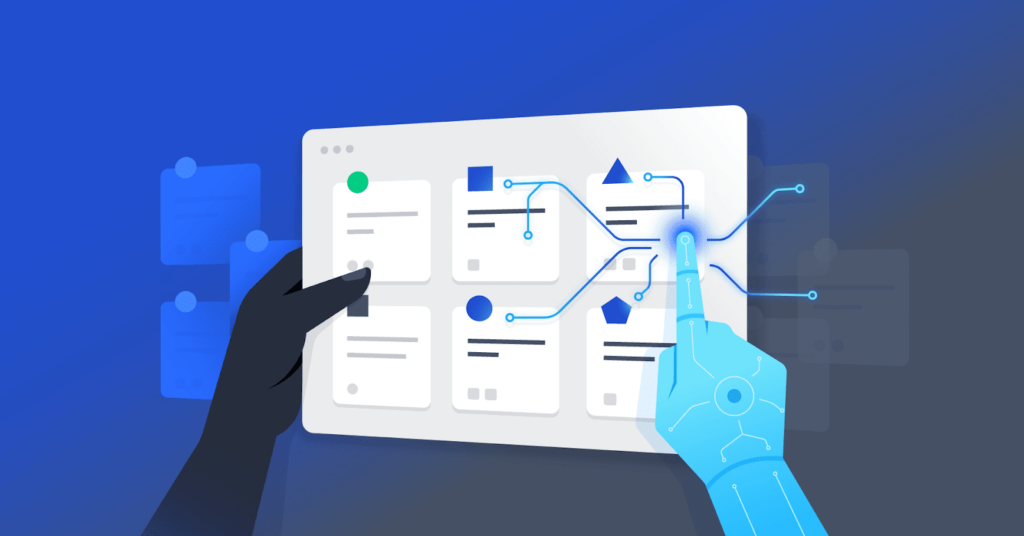In the dynamic and uncertain world of project management, staying organized and on top of all project-related processes is essential for success. As technology continues to evolve, AI virtual assistants are emerging as invaluable tools for project participants, offering unprecedented levels of efficiency, automation, and decision-making support.
Popular examples of AI virtual assistants are Amazon’s Alexa, Apple’s Siri, and Google Assistant; an example of an AI assistant for project and resource management is Epica in Epicflow resource management tool.
Read further to learn more about AI assistants’ capabilities and about the multifaceted ways in which they are transforming the landscape of project management.
What is AI Virtual Assistant?
An AI virtual assistant is a software application that utilizes artificial intelligence technologies, including natural language processing (NLP), machine learning, and sometimes voice recognition, to provide interactive and intelligent support to users. These virtual assistants are designed to understand and respond to user queries, perform tasks, and offer information or services in a manner that simulates human-like interaction.
Let’s review the key capabilities of AI virtual assistants in more detail.

Natural Language Processing (NLP)
Virtual assistants are capable of understanding and interpreting human language, both written and spoken. NLP enables them to process and comprehend user input, making interactions more natural and intuitive.
Machine learning
Machine learning algorithms empower virtual assistants to learn from user interactions and data, improving their ability to understand user preferences and context over time. This adaptive learning allows them to offer more personalized and relevant responses.
Automation
Virtual assistants can perform a variety of tasks on behalf of users, ranging from setting reminders and sending messages to more complex activities like data analysis and scheduling. This automation streamlines processes and enhances user productivity.
Voice recognition
Virtual assistants can support voice commands, allowing users to interact with them through spoken language. Voice recognition technology enables the virtual assistant to understand and respond to verbal instructions.

Integration with applications and services
Virtual assistants often integrate with other applications, services, and platforms. This integration enables them to access and retrieve information from different sources, perform actions across various tools, and provide a centralized point of interaction for users.
Context awareness
Advanced virtual assistants are designed to be context-aware, meaning they can understand the context of a conversation or series of interactions. This enhances their ability to provide coherent and relevant responses based on the ongoing dialogue.
Multi-functionality
AI virtual assistants can handle various functions, from answering general questions and providing updates to more complex tasks like managing calendars, setting appointments, and even keeping track of team members’ workload.
Continuous improvement
Through ongoing machine learning and data analysis, virtual assistants can continuously improve their performance. They can adapt to changing user needs, learn from new information, and refine their capabilities.
Now that the essential capabilities of AI assistants are clear, let’s review how they can be used in project management.
The Benefits of Using AI Virtual Assistants in Project Management

Virtual assistants can be used to improve the following project management processes.
Task Management
The number of tasks to complete as part of a project or multiple projects can be huge; at the same time, it’s critically important to keep track of their completion and timely delivery of milestones. AI virtual assistants can automate some routine tasks, from setting deadlines to sending reminders. These assistants ensure that no task falls through the cracks, allowing project managers to focus on higher-level strategic activities.
Facilitating Communication and Collaboration
AI virtual assistants equipped with NLP capabilities enable natural and intuitive communication. Team members can interact with the virtual assistant through voice or chat interfaces, making task assignments, status updates, and information retrieval more seamless. This enhances collaboration and reduces the need for manual data entry, which in turn saves time. For example, the above-mentioned virtual assistant Epicflow’s Epica can send reminders to the team members about updating their working hours.
Also, these assistants foster a collaborative environment, especially in remote or distributed teams thanks to facilitating real-time information exchange, task updates, and progress tracking,
Smart Scheduling and Resource Allocation
Efficient project management requires careful scheduling and optimal resource allocation. AI virtual assistants analyze project timelines; team members’ workloads, availability, capacity as well as historical data to suggest optimal schedules and/or resource allocation options. They can also assist in identifying resource gaps and recommend adjustments to ensure smooth project progression.

Data Analysis and Decision Support
Leveraging AI’s analytical capabilities, virtual assistants can process vast amounts of project data to generate valuable insights. From identifying potential risks to highlighting areas of opportunity, AI assistants empower project managers with data-driven decision support, contributing to more informed and strategic choices.
Here’s one more example of Epica virtual assistant of Epicflow: it can notify a project/resource manager that some of the resource groups are overloaded so they don’t have to analyze the corresponding data themselves.
Adaptability and Proactive Issue Resolution
Projects are inherently dynamic, with requirements and priorities evolving over time. AI virtual assistants can adapt to these changes by adjusting project plans, reallocating resources, and ensuring that the project remains aligned with organizational goals despite shifting circumstances.
AI assistants also excel at proactive issue identification and resolution. By continuously monitoring project metrics and performance indicators, these assistants can alert project managers to potential challenges, enabling preemptive action to keep projects on track and mitigate risks before they escalate.
Integration with Project Management Tools
Seamless integration with popular project management tools is a hallmark of AI virtual assistants. Whether syncing with task boards, calendars, or collaboration platforms, these assistants ensure a cohesive and synchronized project management ecosystem, reducing the need for manual data updates across multiple systems.
Conclusion
As project managers navigate the complexities of modern project environments, AI virtual assistants stand as indispensable helpers. From automating routine tasks to providing sophisticated data analytics, these assistants enhance efficiency, reduce the risk of errors, and empower project managers to make informed decisions. Embracing AI virtual assistants in project management is not just a technological leap but a strategic imperative for organizations seeking to achieve optimal outcomes in their projects. The future of project management is undoubtedly shaped by the synergy of human expertise and AI assistance, unlocking new possibilities for success in every project undertaken.

